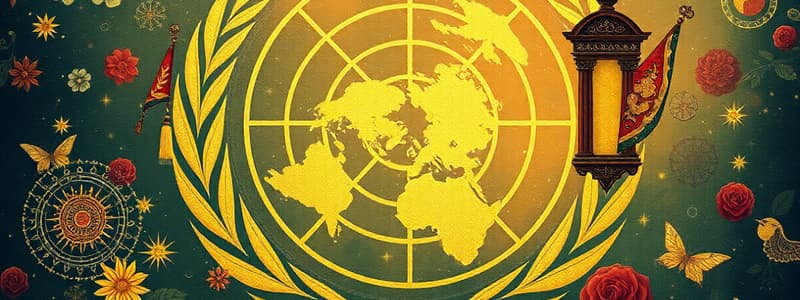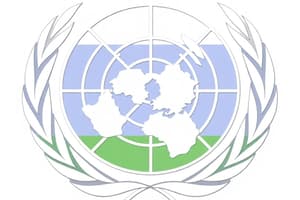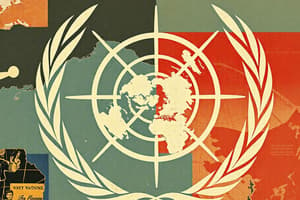Podcast
Questions and Answers
Which of the following is NOT a United Nations body?
Which of the following is NOT a United Nations body?
- Security Council
- International Court of Justice
- Congress of Vienna (correct)
- General Assembly
What principle was established by the Peace of Westphalia?
What principle was established by the Peace of Westphalia?
Sovereignty
The Congress of Vienna aimed to challenge the sovereignty of European powers.
The Congress of Vienna aimed to challenge the sovereignty of European powers.
False (B)
The Thirty Years’ War occurred between ____ and ____.
The Thirty Years’ War occurred between ____ and ____.
What is the primary goal of theory in international relations?
What is the primary goal of theory in international relations?
Match the following theories of international relations with their primary characteristics:
Match the following theories of international relations with their primary characteristics:
List the two types of sovereignty.
List the two types of sovereignty.
Flashcards are hidden until you start studying
Study Notes
United Nations
- Six main bodies: Security Council, General Assembly, Economic and Social Council, Secretariat (Secretary-General), International Court of Justice, and Trusteeship Council
- The General Assembly has 193 members, the Holy See and the State of Palestine are not represented
- The General Assembly meets in New York every year from September to December for its main part
- The General Assembly meets again from January to September for the resumed part
- The 79th session began in 2024 as 1945 + 79 = 2024
International Relations
- The Thirty Years’ War (1618–1648) is considered the beginning of modern international relations
- The Peace of Westphalia (1648) established the principle of sovereignty and the political rights of monarchs
- The Peace of Westphalia in 1648 laid the groundwork for the formation of the modern nation-state
Sovereignty
- Two types: Internal and External
- Internal Sovereignty: Monopoly of effective use of force inside a country
- External Sovereignty: Recognition by other states as one of their peers
Congress of Vienna
- A series of high-level meetings meant to reorganize the European political boundaries after the Napoleonic Wars, reestablish the old monarchies, and redistribute power among themselves to enable a balance of powers and keep peace.
- The Congress of Vienna maintained a relative peace among European Powers until 1914
Balance of Power
- Two strategies:
- Building our power internally (e.g., increasing military budget, draft, etc.)
- Creating an alliance with other concerned nations
- Balance of Power Process: The process by which different actors put their strength together to oppose a rising and threatening actor.
World War I
- Germany, Austria-Hungary, and the Ottoman Empire fought against Great Britain, the U.S., France, Russia, Italy, and Japan + smaller powers
- More than 9 million soldiers and 40 million people died
World War II
- Approximately 3% of the world population died
- 70-85 million people died
Theory
- A generalization to limit the amount of information which is necessary to understand an event by focusing on a limited number of important variables.
- An analytical tool which simplifies reality
- Ultimate goals are prediction and control.
Uses of Theory
- Describe: Provides an overview of the ideas, concepts, event, or action
- Explain: Why the outcome occurred based on the theory
- Predict: Using the theory be able to predict future occurrences of the event or outcome
- Control
Main Actors in the International System
- Nation-States
- International Organizations (IO)
- Multinational Corporations (MNC)
- Non-governmental Organizations (NGO)
- Non-state actors such as individual leaders, Terrorist groups, famous individuals
Levels of Analysis
- Global Level: Factors that operate at an international level (e.g., international regimes, the international system)
- Interstate Level: Interactions that occur among states (e.g., alliances, wars, diplomatic negotiations)
- Domestic Level: Internal factors within states that influence state behavior (e.g., government policies, public opinion, domestic political dynamics)
- Individual Level: The motivations, beliefs, and actions of individuals that influence international relations (e.g., leaders, diplomats, key decision-makers)
Theories of International Relations
- Realism
- Liberalism
- Constructivism
- Historical Materialism
- Feminism
Main Actors, Variables, Nature of Politics, Possibility of Change, Level of Analysis in Theories of International Relations
- Realism:
- Main Actor: States
- Main Variables: Military Power
- Nature of Politics: Conflictual
- Possibility of Change: Pessimistic
- Main Level of Analysis: Interstate
- Liberalism:
- Main Actor: States and other actors
- Main Variables: Economic Power
- Nature of Politics: Cooperative
- Possibility of Change: Optimistic
- Main Level of Analysis: Global, Interstate, Domestic, Individual
- Constructivism:
- Main Actor: States and other actors
- Main Variables: Ideational and Material Power
- Nature of Politics: Conflictual and Cooperative
- Possibility of Change: Optimistic
- Main Level of Analysis: Global, Interstate, Domestic
- Historical Materialism:
- Main Actor: Economic Classes
- Main Variables: Material Power
- Mature of Politics: Conflictual
- Possibility of Change: Optimistic (focused primarily on societal change)
- Main Level of Analysis: Global
Studying That Suits You
Use AI to generate personalized quizzes and flashcards to suit your learning preferences.




